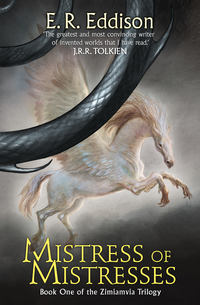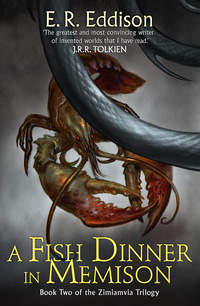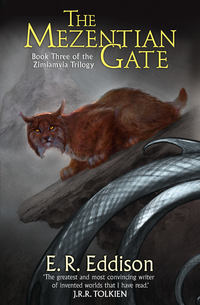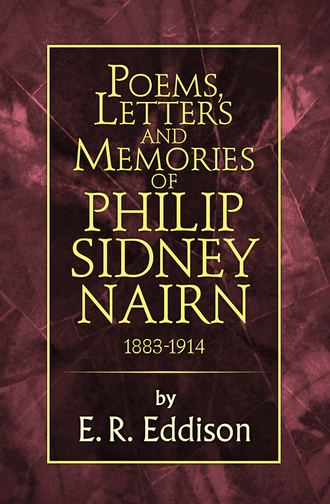
Полная версия
Poems, Letters and Memories of Philip Sidney Nairn

POEMS, LETTERS, AND MEMORIES OF PHILIP SIDNEY NAIRN
ARRANGED BY
E. R. EDDISON
Late of Trinity College, Oxford
PRINTED FOR PRIVATE CIRCULATION
LONDON, 1916

Copyright
Published by HarperCollinsPublishers Ltd
1 London Bridge Street
London SE1 9GF
www.harpercollins.co.uk
Copyright © E. R. Eddison 1916
Jacket illustration © HarperCollinsPublishers Ltd. 2014
E. R. Eddison asserts the moral right to be identified as the author of this work.
A catalogue copy of this book is available from the British Library.
All rights reserved under International and Pan-American Copyright Conventions. By payment of the required fees, you have been granted the non-exclusive, non-transferable right to access and read the text of this e-book on screen. No part of this text may be reproduced, transmitted, down-loaded, decompiled, reverse engineered, or stored in or introduced into any information storage and retrieval system, in any form or by any means, whether electronic or mechanical, now known or hereinafter invented, without the express written permission of HarperCollins.
Source ISBN: 9780007578078
Ebook Edition © 2015 ISBN: 9780007578085
Version: 2014-12-16
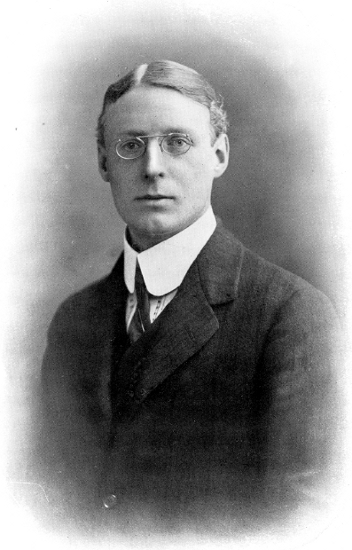
P. S. F. NAIRN IN 1907.
[From, a photograph by Martin Jacolette.]
CONTENTS
Cover
Title Page
Copyright
List of Illustrations
Preface
I. Introduction
II. Family, Birth, and School Life
III. Oxford and Stettin
IV. Kelantan and the Federated Malay States
V. Life and Literature
POEMS
MISCELLANEOUS POEMS:
Exile
To J. C.
Desiderium
To E. R. E. (on receiving a certain letter)
To Miss M. H.
In the Buchheide
The Dawn of Love
Retrospect
A Fallen Socrates
Reverie
Rejected Verse
Blore’s
To Smudge – my Dog
To my German Class
To Mrs Honey
For Jess
For Miss E. S.
To Phoebus Apollo
For Barbara
For Miss E. Brown
For Miss M. Brown
Advance, Australia!
‘Altogether Piffle’
Why Not?
At Parting
To the Unknown Goddess
To J. M. C.
Off Malacca
Sundown in the Rains
To E. R. E. (on news of his engagement)
Fragment
Trois Ans Après
Hélas
F. M. S. DITTIES:
To my Nearest Neighbour
The Point of View
Mischievous
The Volunteer Dance
‘He slumbered in Carcosa’s stead’
Metamorphosis
Upon the Troublesome Times
The Seats of the Mighty
Day-dreams or Nightmare?
Furious Driving
Still the Everlasting ‘Dreadnought’
Some Quatrains from the Selangor Golf Club
TRANSLATIONS:
Near to my Love
Night
Late Summer
The Asra
Anacreon’s Grave
To my Absent Love
Ultimus Cursus Vitae
Appendix I
Appendix II
Footnotes
Also by E. R. Eddison
About the Publisher
LIST OF ILLUSTRATIONS
1. P. S. F. Nairn in 1907
2. Five Years Old
3. At the Foot of Wastwater, April 1906
4. At Oxford, on the Cherwell
5. Nairn’s Bungalow at Kota Bharu
6. A Garden Party at the Residency
7. Group on the Tennis Lawn
8. Nairn with his Sikhs
9. Proclamation of King George V at Kuala Pilah
10. Two Scenes on the Straits of Malacca
11. The District Officer’s Quarters at Port Dickson
PREFACE
The verses which form the original and essential part of this book are somewhat overshadowed in bulk by the introductory Memoir. The justification of this (to my mind a complete justification) is that it is due not (at least I hope not) to prolixity on the part of the editor, but to the inclusion of long quotations from Nairn’s letters and from his diary. Some of the poems are undoubtedly worthy, in themselves and for their own sake, to be preserved. But their author wrote himself down less vividly and unmistakably in these essays in finished art than in his less studied writings, and any lasting value possessed by this compilation will, in my opinion, rest chiefly on such success as it may have in snatching from oblivion some living traits of a personality which has far more than a personal interest.
Of the defects of my share in the book I am painfully aware. It has been written in time of war, on Sundays or on late evenings, in such moments of leisure as could be found amid urgent official duties. In more favourable circumstances the area of correspondence covered might have been widened, and the balance of the whole better adjusted.
In my estimate of Nairn’s character I do not pretend to be judicial. I have, however, kept a watchful eye on the pardonable leanings of a friend’s judgment towards mere eulogy. I have made no statement which has not been weighed, nor any which I do not believe to be true.
I desire to thank my friend Mr Henry Nairn for the compliment he has paid me in asking me to undertake this work, and for the assistance and information which he has ungrudgingly placed at my disposal. Also my old friend Captain M. H. Woods, for permitting me to take his name in vain. For the local and historical particulars of Kelantan I am chiefly indebted to Mr W. A. Graham’s book, which is, I believe, still the chief authority on that State. I must finally record my obligations to the Editors of the Pall Mall Gazette and the Malay Mail, who have kindly consented to the reproduction of poems which appeared originally in their publications. Two sonnets, Exile and In the Buchheide, appeared in the Pall Mall Magazine, now incorporated with Nash’s Magazine. Finally, it may be noted of the pictures that Nairn appears in all of them.
E. R. E.
November, 1915.
CHAPTER I
INTRODUCTION
There are men and women of such vitality of spirit, in whom the roots of thought, of action, and of affection seem so firmly set, so safely and naturally engrafted on those abiding principles of reason, efficiency, and goodness which are the starting-point and the goal of all sane philosophy, that the mere calling of them to mind seems to question the finality of death. The barriers of the grave at the passage of such souls, put off, after the first bitterness of sorrow, their irrefragable and inexorable darkness, shrinking to a reality more tolerable and more transient; as, in Meredith’s romance, the palace of Rabesqurat, Mistress of Illusions, was dissipated in the light of the Lily. This instinctive sense of death as transition, not dissolution, is a rare consolation left by such personalities to relatives and friends bereaved. It is independent of all creeds and philosophies: a conviction to be fostered if we are wise, if only because it is productive of a saner and truer habit of mind in thinking of our friend. That for the term of this life we have lost him, that in the height of his youth and promise his career has been cut short, is hard enough. But it is treason to the memory of one who had in his whole nature nothing akin to death to think of him as annihilated; a condition, moreover, the possibility of which is an assumption as arbitrary and as repugnant to the developed consciousness as the crudest myth of primitive society. There is deep truth and justice underlying the saying of the dear old Abbé Jérôme Coignard: ‘Votre crapaud à tête de chat n’est pas plus véritable que la Nymphe de monsieur que voici; et de plus, c’est une invention dégoûtante.’
Of such a quality of vital power and being was Philip Sidney Fletcher Nairn. And I have said so much to explain why in writing of my friend I will not use the tone of a funeral oration. According to medical authority, death came to him suddenly and painlessly on that May evening on the coast of Negri Sembilan. Changing his clothes for dinner after a motor drive, he was seized by an attack of haemorrhage, and in half a minute all was over. He was spared the misery of an illness. It would have been difficult for those who loved him to wish him a more merciful ending. Nor is there any gain in dwelling on this last momentary sad scene of a full and happy life. To name him calls up his image in settings far different: his fine athletic figure at work in the ‘scrum’, or braced against the wind on the Pikes of Scafell, or dark against the sunset on the level summit of the Pillar; or deep in a big armchair reading aloud perhaps, Webster, Meredith, or Omar, talking of books or plays, spinning yarns, guessing at the riddles of the Sphinx, in some of our rooms at Trinity on one of those noctes ambrosiana, sacred to youth and friendship, redolent of tobacco-smoke and wine; or on some wilder nox Neroniana, when the bonfire shamed the stars, and as night grew old the ‘Alpine Club’, of which he was no obscure member, went secretly forth to new conquests. Or, most familiar to those who were with him in the East, the picture of him that belongs to the last seven years of his life, living the free active life that he loved, laying in able, thorough, and human administration the foundations of a career that promised to be of high distinction and Imperial value.
In person, Nairn was what the sagas call mikill ok sterkr – a big man and a strong. In height he was over 6ft 3in., and 13 stone in weight. Unlike many tall men, he was well knit and well proportioned. His complexion was very fair, until the tropics tanned it; his hair very fair, his features well cut, his eyes blue. He was short-sighted and always wore pince-nez. His voice was pleasant, strong, and expressive; his laugh big and merry, and of a quality to make others laugh with him. At rest, his expression was grave and alert, but the humorous lines were always ready to show themselves at the corners of his mouth and eyes. His manner to strangers had a certain courtliness, but he could at need be truculent enough. He was quick-tempered, but not a bearer of malice. He was a good observer and a judge of men. It was well said of him that his friends prized his friendship the more because he did not suffer fools gladly. The whole effect of his presence was singularly buoyant and sunny. With his intimate friends he adopted, when in good spirits, a tone half mocking, half hectoring, and entirely delightful. The nearest thing to it I can think of in literature is the jesting bravado of Mercutio. Its charm is incommunicable, except in so far as it may be caught in certain passages of his diary and private letters reproduced in this volume.
Such letters and such extracts I make no apology for having introduced freely and fully, and with the least possible mutilation. A heavy responsibility must always attach to the giving of private letters to the general public. The justification for so doing lies in their value from a literary and biographical point of view. That expurgation, in the case of a document of real merit, means emasculation, is an axiom which Nairn always joined me in upholding; and I am concerned rather to present a true and lovable portrait of him to those who can appreciate it, than to perpetuate a washed-out travesty which shall appeal to the susceptibilities of persons whose opinion is negligible. Most of all I would not dim the impression of a spirit, which, had it encountered like misfortune, would have lived up to the example of that McPherson sung by Burns:
Sae rantingly, sae wantonly,
Sae dauntingly gaed he;
He played a spring and danced it round
Below the gallows tree.
CHAPTER II
FAMILY, BIRTH, AND SCHOOL LIFE
Mr Henry Nairn, who has taken some pains to investigate the early history of the Scottish house to which he belongs, has been led to the conclusion that all of the name of Nairn or Nairne are probably of common descent, going back to one Michael de Nairne, who lived at the end of the fourteenth century. This Michael signed as a witness, in his capacity of Shieldbearer to the Regent Albany, the compact of battle between the rival Clan Quhele and Clan Chattan before their fight described by Scott in his Fair Maid of Perth. The line has been carried back yet further, though with less certainty, to one Murdochus Nairne whose son, Hercules, witnessed a charter in 1211. It is matter for speculation whether the origin of the family was Keltic or Italian. Whatever may be the truth as to this, it is certain that the family is ancient, began with considerable dignity, and flourished for some centuries. Later it fell on evil days, and most of the estates passed into the female line.
The branch which concerns us made its home in Northumberland. William Nairn, the son of William Nairn who was Baillie of Dalkeith, appears to have left Scotland and settled in the parish of Kirkwhelpington, a remote village in the Cheviots near the Scottish border, in or before 1737. In the following generations the family moved to Rothbury and thence to Newcastle-on-Tyne, where, about the year 1800, was established the commercial firm well known in the North for over half a century as Philip Nairn & Sons, shipowners and corn importers. Philip Nairn of Waren, the son of the founder of this firm, was a man of distinguished personality, well known, popular, and respected by all classes of people with whom he came into contact in Northumberland, where for many years he enjoyed the distinction of being the largest farmer and the largest grain merchant between the Forth and the Tyne. In politics a Whig of the old school, he was a powerful supporter of Lord Grey when Prime Minister, of his son Lord Howick, and of Sir George Grey of Falloden. This political connection created an intimacy with the many sons of the Prime Minister, all of whom were frequent guests at the Waren dinner parties, which Mr Nairn’s lavish hospitality and the charm, intellectuality, and social gifts of his wife made famous throughout the county. Nor were the guests at these dinners limited to his own political party. He practically kept open house; nobody, whatever his rank or position, left Waren without partaking of its well-known hospitality, and the servants’ hall was rarely empty. In the early fifties a series of disastrous losses of uninsured property, combined with the effect of the introduction of telegraphy which militated against the somewhat old-world methods of Philip Nairn & Sons, and nullified the advantage hitherto enjoyed by Mr Nairn as indisputably one of the best judges of corn in England, brought an end to this prosperity. He moved to Wetheral, near Carlisle, where he died somewhat suddenly in 1859. His son, Mr Henry Nairn, moved to London to take up the clerkship in the Government Service which he held for over forty-two years.
One point, perhaps the most interesting of all, must be mentioned before I pass to the main subject. The descent of the Nairns of Northumberland from William Nairn, Baillie of Dalkeith, though it rests on the strongest circumstantial evidence, probably could not be proved in a court of law. If, however, as seems reasonable, this descent is taken as established, it connects the family by direct succession in the female line with William Drummond of Hawthornden, the poet and friend of Ben Jonson, and one of the most brilliant men of letters of the late Elizabethan times. If this be so, the poetical gifts which produced the verses which form this volume may reasonably be attributed to heredity throwing back in the ninth generation to Drummond of Hawthornden. fn1
Philip Sidney Fletcher Nairn was born at Bromley, Kent, on December 11th, 1883: the only son and youngest child of Mr Henry Nairn, late of H.M. Civil Service. His mother died when he was only seven years old. She was a woman of singular charm, beloved by all who came into contact with her. From her, her son inherited the charming personality which made him so popular with all who knew him, and also his linguistic talent; for, born in Naples and educated in Germany, she spoke with equal facility English, French, German, and Italian. Through her he descended from a branch of the Campbell family. His great-grandfather, an officer in a Highland regiment, on retiring from the Service settled at Naples, and married a Sicilian lady. Much of the Sicilian blood showed itself in Nairn in his childhood; from the earliest age he gave signs of those dramatic, poetic, and imitative powers which there is little doubt descended to him from that histrionic race. His home was at Wimbledon from the time of his mother’s death until he left England sixteen years later for the East.
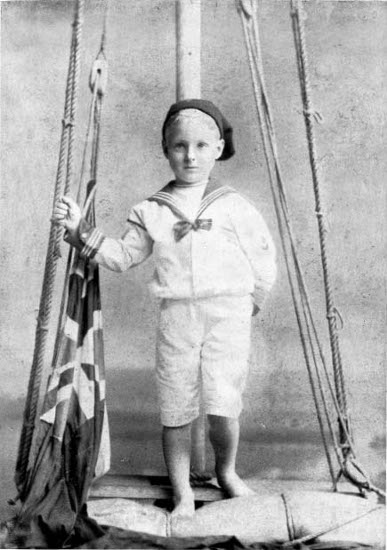
FIVE YEARS OLD.
[From a photograph by Lavender, of Bromley, Kent.]
At the age of seven he went to a dame’s preparatory school at Wetheral, and two years later to Rokeby School, The Downs, Wimbledon, an excellent preparatory school managed by Mr C. D. Olive, M.A., of Christchurch, Oxford. In 1896 he obtained a Foundation and a House Scholarship at the King’s School, Canterbury. This is the oldest school in the British Empire, founded in the sixth century in the time of St Augustine, and ideally situated in the precincts of Canterbury Cathedral. fn2
The Dean of Canterbury when Nairn was at school there was the well-known writer, Dr Farrar. As an old Headmaster the Dean took a great interest in the King’s School, of which, in his capacity of head of the Cathedral Chapter, he was principal Governor, and it was his custom always to have one of the sixth form boys to act as his unofficial and part-time private secretary and assist him in his correspondence. On Nairn’s entering the sixth form he was selected by the Dean for this post. The Dean took a great personal interest in him, and often asked him to meet his distinguished guests at the Sunday morning breakfasts which were a feature of the Deanery hospitality. It was good for him intellectually, as well as entertaining, to listen to the conversation between his host and the celebrated divines, politicians, writers, and statesmen who were present on these occasions.
Nairn was very happy at Canterbury, where, as elsewhere, he was successful in his studies and in his games. He rose to be Head Monitor, and was also Captain of the Rugby Fifteen and Champion Swimmer and Diver. Cricket he never excelled in, because of his defective eyesight. He was Vice-Captain of the school, and just missed becoming Captain.
His summer holidays were generally spent abroad – principally in Normandy – with his father and sisters, and were thoroughly enjoyed. In this way he came to know most of the north of France, besides parts of Belgium and Germany. His visits to Lindenfels and Eppstein in Germany covered the Odenwald and Bergstrasse, Frankfurt, and the Rhine from Rotterdam to Mayence; from Éprave and Hastière he journeyed over all the Forest of Ardennes, and visited Dinant, Brussels, and Bruges; while his holidays in Normandy at Arromanches, Langrune, St Pierre, and at St Jacut and elsewhere in Brittany, made him acquainted with nearly the whole country, including the ‘Suisse Normande’.
CHAPTER III
OXFORD AND STETTIN
Nairn came up to Trinity College, Oxford, in October 1902, and by virtue of being a Scholar (he had won two Exhibitions at Trinity, the Ford and the Rose) was given rooms in College at once, an advantage which is denied to many freshmen. He first had rooms on the Bell staircase in the Chapel Quad, and later in Kettle Hall, where he was a near neighbour to certain of the elect of the year immediately senior to his own, who had, according to compact, made their quarters in the New Buildings in close proximity, and among whom he was to form some of the most valued friendships of his Oxford days.
’Varsity life is a peculiar and precious growth of English soil – it were truer to say of Oxford and Cambridge soil. It is easy to miss getting from it the full measure of what it has to give, and these golden four years between boyhood and manhood may be wasted not less by undue application to study than by over-addiction to those distractions which abound by day and by night in and about our universities. Happy the man who can so spend those halcyon days as to feel, looking back in later years, regret indeed that they are past, but no remorse for lost opportunities, whether grave or gay, of storing his youth with experiences, associations, discoveries, enthusiasms, friendships, that bear with them into the soberer years of after-life a flavour and a fragrance not elsewhere to be gathered. Nairn had, as not many men have, I think, this happiness, this power of high-spirited enjoyment of every side of life, guarded by the saving principle of μηδὲν ἄγαν.
After all, the purpose of Oxford is education: to it belongs the last step in that process before the tables are set for the serious game of life, where no false move can be recalled. And lectures and texts form but a small, and not perhaps the most important, part of the fountain of learning which an Oxford life affords. To the official side of the curriculum Nairn paid so much attention as to obtain a Third Class in Honour Mods, and a Second in History – a degree which would be in itself a credit to a man of moderate parts. To this it may be added that he played Rugby football for his college, and on one occasion played for the ’Varsity, though he did not obtain his blue. But the main part of his life at Trinity, and that to which I know he looked back with pleasure and affection, was represented by those social and intellectual activities which lie outside the rut of what is, after all, schoolboy work and play. I include under this head river excursions, motor drives, walks in the parks or the surrounding country, midnight symposiums, philosophic and unphilosophic, andante piacevole and presto con fuoco, wherein he took part not perhaps always wisely yet seldom too well; activities, let me add (if any over-serious reader haply of the fairer sex should scent herein matter of offence), entailing no incident of which he or any sensible person need feel ashamed. Dulce est desipere in loco. It is to be set down to his wisdom and the soundness of his character in these merry opening years of manhood that these adventurous or Anacreontic interludes never reached the point of embroiling him seriously with the College authorities and imperilling his continued residence at that seat of learning. So far as I remember, the gravest charge he was called upon to answer was when he and certain jolly companions were haled before the Proctors and fined £2 apiece for paying their respects at a late hour to some attractive young ladies, not unconnected with the musical comedy stage, who happened to be staying a few days in Paradise Square.



